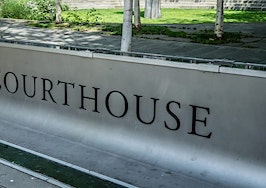- The deal resolves all claims in litigation that began with Move and its co-plaintiff, the National Association of Realtors, filing a lawsuit against Zillow and Zillow executive Errol Samuelson in March 2014 for misappropriation of trade secrets.
Archrivals Zillow and realtor.com operator Move Inc. have reached a settlement for $130 million after more than two years of bitter legal combat.
Before the settlement, the case was scheduled to go to jury trial today. None of the parties admitted any liability, wrongdoing or responsibility in the settlement agreement, according to a Zillow Group public filing. The agreement stipulates Zillow will pay the funds in full by June 20.
Move’s co-plaintiff, the National Association of Realtors, is entitled to 10 percent of the settlement proceeds after deduction of Move’s litigation-related costs and fees, with the remainder being paid to Move, according to a News Corp. public filing.

Errol Samuelson
The deal resolves all claims in litigation that began with Move and NAR filing a lawsuit against Zillow and Zillow executive Errol Samuelson in March 2014 for misappropriation of trade secrets, among other claims.
Zillow executive Curt Beardsley was added to the suit a year later. Samuelson and Beardsley are both former Move employees and now Zillow’s top representatives to the real estate industry.
In August 2015, Zillow filed a countersuit against Move and NAR alleging defamation and misappropriation of trade secrets in relation to a so-called “whistleblower letter” penned by former Zillow executive Chris Crocker.
Both Zillow Group and News Corp. have sunk tens of millions into the litigation. Each claimed their ability to compete for agent dollars and consumer mindshare were at stake.
Zillow, Move, and NAR respond
“Today, we reached an amicable resolution to settle our lawsuit with News Corp. and the National Association of Realtors,” said Zillow spokeswoman Amanda Woolley in an emailed statement.
“The agreement allows us to put this litigation behind us, and continue our focus on innovation and the huge opportunity in front of us as the consumer-focused market leader.”
She declined to comment on the timing of the settlement.
When asked whether Zillow planned to keep Samuelson and Beardsley on as employees, Woolley said, “As we’ve said, we completely support both Errol and Curt and appreciate the contributions they’ve made to Zillow Group.”
In an emailed statement, Move spokeswoman Janice McDill said, “We are pleased to have reached an amicable resolution of this litigation. We look forward to putting the matter to rest and returning our full focus to simplifying the real estate process for consumers and the real estate professionals who serve them.”
Move declined to comment further.
In a statement, NAR President Tom Salomone said the trade group was pleased that Zillow had agreed to a settlement amount of $130 million in damages instead of going to trial.
“Realtors stand for ethical business practices — whether we’re serving our clients online or in the real world — and this settlement reinforces our resolve,” he said.
“NAR’s relationship with Move, Inc., and realtor.com is based on a mutual respect for Realtors and their efforts to bring online home buying and selling resources to consumers, and the defendants named in the lawsuit have not demonstrated that same respect.”
Money, money, money
Salomone said Move covered the costs of the lawsuit and will receive the bulk of the settlement funds.
“[I]t is NAR’s hope that they will invest this money in initiatives that enhance consumer experience on realtor.com and benefit our members in support of the Realtor brand,” he said.
After the amount NAR will receive is determined, “NAR’s Leadership Team will consider how best to apply those funds in service of NAR’s Realtor members; we will share that information as soon as a decision is made,” he added.
In public filings, Zillow Group said it spent more than $27 million in 2015 on the litigation and another $15.7 million in the first three months of this year. In February, the company projected it would spend an additional $36 million on the suit this year. That’s money the company said it could otherwise have used to support innovation and growth or to boost company profits.
Legal analyst Thomas Claps of Susquehanna Financial Group estimates the case has cost Zillow nearly $200 million total, including the settlement.
“Given these mounting legal bills, Zillow had incentive to settle,” Claps said in a research note.
The suit has also cost News Corp. millions, though perhaps less than Zillow Group. News Corp. spent a combined $11 million on the litigation in two of last year’s four quarters, according to earnings call transcripts. Move declined to comment on how much it has spent on the suit.
Court cuts damages claim nearly in half
The settlement deal comes after a Washington state judge last week cropped about a billion dollars from the damages claims of the plaintiffs, News Corp. subsidiary Move and the National Association of Realtors.
Judge Sean O’Donnell of King County Superior Court first dismissed Move and NAR’s $384 million claim for actual damages as a result of alleged misappropriation of trade secrets related to merger talks between Move and Trulia.
The judge’s order allowed the plaintiffs to continue to pursue their $803 million damages claim for “unjust enrichment” in relation to Zillow’s merger with Trulia.
But on Friday, O’Donnell ruled to exclude the testimony of plaintiffs’ expert Bradford Cornell, a financial economics professor at the California Institute of Technology, on a $778 million damages claim for the scuttling of Move’s “ListHub 2.0” platform strategy and on a $43 million claim for damages to realtor.com.
The judge allowed Cornell to testify in regards to a $65 million damages claim in relation to Move’s original ListHub strategy and to a $149 million claim for Move’s costs to develop trade secrets and confidential information.
This left the estimated damages in the case at about $1.017 billion ($803 million + $65 million + $149 million).
Susquehanna’s Claps has previously noted that Move’s original damages claim of around $2 billion was so high that it would have made settlement more difficult. On Friday, Claps said the “significant” damages reduction in the case provided Zillow with settlement negotiation leverage leading up to the trial.
“When Plaintiffs’ requested damages in a litigation get cut by (around) 43 percent, which occurred on Friday, the probability of a settlement increases, which we saw play out today. We believe that last Friday evening’s ruling was the primary reason why Move decided to settle the case,” Claps said in a research note today.
Relief for Zillow and its investors
The $130 million settlement by Zillow should be a relief for investors, avoiding more significant damages and lifting a “legal overhang,” Claps said.
The settlement also allows Zillow to dodge risks related to the impending trial.
“By settling now, Zillow avoids the uncertainty of a jury trial, especially in a case involving numerous allegations of trade secret theft against Zillow and its employees,” as well as a “damaging” sanction against Zillow exec Beardsley, Claps said.
After a lengthy hearing in April, O’Donnell last month declined to impose sanctions on Zillow or Samuelson for alleged evidence destruction in the case, but ruled that Beardsley destroyed evidence willfully and in bad faith.
The ruling would have allowed Move and NAR to issue an instruction to the jury during the trial allowing the jury to infer the missing evidence would have benefited their case — or, alternatively, hurt Beardsley’s case.
“As evidenced by Zillow’s numerous recent Court filings, Zillow was extremely concerned that this sanction would have a damaging, prejudicial, ripple effect at trial against Zillow and defendant Errol Samuelson. By settling the case, Zillow avoids this risk,” Claps said.
Zillow also escapes having to put its CEO, Spencer Rascoff, on the stand at trial, Claps added.
When Rascoff testified at the evidence spoliation hearing in April, Claps said at the time that Rascoff “appeared uncomfortable on the stand and occasionally seemed agitated. His direct testimony seemed rehearsed and unconvincing. Moreover, he admitted that Beardsley mishandled information in the case, including deleting documents and materials.”
“By settling today, Zillow avoids having to put Spencer Rascoff back on the stand — this time in front of a jury — to defend these claims,” Claps said.

Curt Beardsley
Editor’s note: This story has been updated with comments from NAR, an additional comment from Zillow, and comments from litigation analyst Tom Claps.













